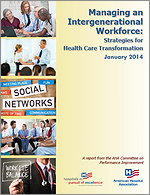Managing an Intergenerational Workforce: Strategies for Health Care Transformation
 Generational differences—one factor of diversity—are rapidly changing workforce dynamics. Traditionalists, baby boomers, Gen Xers and millennials have different priorities, attitudes, communication styles, work approaches and ways to interact with colleagues, which are influencing organizational culture and performance. Hospital and care system leaders can leverage common and unifying characteristics across all generations to create efficient teams. This is critical to finding success in a value-based environment and achieving Triple Aim outcomes—improved population health, better individual care experience and lower per capita cost of health care.
Generational differences—one factor of diversity—are rapidly changing workforce dynamics. Traditionalists, baby boomers, Gen Xers and millennials have different priorities, attitudes, communication styles, work approaches and ways to interact with colleagues, which are influencing organizational culture and performance. Hospital and care system leaders can leverage common and unifying characteristics across all generations to create efficient teams. This is critical to finding success in a value-based environment and achieving Triple Aim outcomes—improved population health, better individual care experience and lower per capita cost of health care.
Because health care is a people field, the 2013 AHA Committee on Performance Improvement developed the report Managing an Intergenerational Workforce: Strategies for Health Care Transformation, to help hospitals and care systems build an organizational culture that develops and nurtures employees of all ages to provide excellent patient care. The report outlines three key strategies for health care leaders to implement:
- Build a strong generational foundation: Leaders need to understand their organization’s employee profile and develop programs and policies that will support individuals at all levels of the organization.
- Establish effective generational management practices: Leaders must focus on increasing the level of generational understanding among managers and supervisors so they can better manage their teams and relieve generational tensions in the workplace.
- Build generational competence: Once generational strengths are identified and leaders develop practices to leverage these strengths, they can spread generational understanding and sensitivity among the entire workforce.
The health care industry is faced with an aging cohort of patients and a significant shortage of health care professionals who also are aging. This shift in patient and workforce demographics will create a generational gap between older patients and younger health care providers, affecting the care delivered in hospitals. Hospitals and health systems that create productive multigenerational teams will be well-positioned to handle the evolving challenges of the health care industry. These organizations will thrive with a willing and able labor force that can achieve optimal clinical outcomes and patient experience. In contrast, organizations that fail to effectively manage an intergenerational workforce will experience high employee turnover; pay higher costs for recruitment, training and retention; and have lower patient satisfaction scores and worse clinical outcomes.

